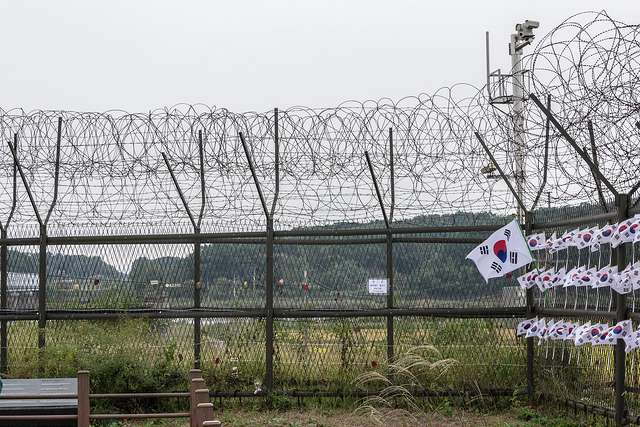Is reunification happening in the Korean Peninsula? Posted by Flying Oyster on Nov 21, 2018 in Uncategorized
Is 통일(Tong-il: reunification) happening in 한반도(Han-ban-do: the Korean Peninsula)?
When I was around 10 years old, I remember I got really scared after listening to the news. The news was about the immediate possibility of invasion by 북한 (Book-han: North Korea). The news showed people frantically stocking up on canned food and 라면(Rah-men: an instant noodle loved by most Koreans) from a grocery store to prepare for the potential emergency. I encouraged my parents to stock up their own emergency food, but my parents *눈 깜짝 안했다 (Noon-Kam-Jack Ahn Hat Dah: didn’t even flinch.) Now, I guess that kind of news was not the first time they had heard it.
People often ask me what I think about 북한(Book-han: North Korea). when I introduce myself coming from 남한(Nam-han: South Korea). It is such a shame to confess this, but I usually don’t have politically correct smart answers because I hadn’t spent as much time thinking about 북한(Book-han: North Korea) as I should have had.
In my defense, 정치(Jeong-Chi: politics) is always the last thing I want to talk about. Secondly, North Korea was an incurious topic to me because I didn’t have any personal dots to connect with. None of my grandparents or parents had any 가족(ka-jok: family) left in North Korea. Thirdly, as most my friends did, North Korea was the country that I mainly learned about from school. Or I learned facts from 대중매체(Dae-joong-mae-chae: mass media) that many people left their 이산 가족 (Ee-san-ka-jok: separated families due to the Korean war) in North Korea. It is quite poignant to think about these people who can’t see their loved ones after all these years.
It is getting close to almost 70 years since 육이오 (Yuk-ee-oh/6.25: the Korean War occurred on 6/25/1950). Currently, 남북통일(Nam-Buk-Tong-il: the reunification between the North and South) is the most frequently spoken word in South Korea. Not only are people talking about it, but also the signs of reunification are emerging in everyday life. For example, I became a big fan of TV talk shows having a group of 탈북민(Tal-buk-min: North Korean defectors) as the main guests. They outspokenly talk about the 문화 (Moon-hwa: culture) and real life in North Korea. One guest, married to a man from South Korea after *탈북(Tal-book: escaping from North Korea), shared her love story. Another guest, who was the daughter of *고위직 장관 (Goh-wee-jick-jang-Kwan: a high-ranking officer), burst into tears saying how much she misses her family and feels terrible about what she did to her family by escaping by herself and so on. Many interesting and unbelievably heart-breaking, but genuine life stories of real people are remembered in my heart.
While I watch the TV show, it has come to my mind that 탈북민 (Tal-buk-min: North Korean defectors) could have been one of my neighbors even my 친구(Chin-goo: friends). They look like me. They may use *생소한(Sang-so-han: unfamiliar and not commonly used) words with an accent, but they speak the same language as I do. Most of all, it surprises me when they share deep-rooted Korean culture despite a several decades of separation.
Some predict the insidious cultural blending will bring a more harmonious reunification sooner and I perhaps think reunification may have already started without a big announcement. I am optimistic that reunification will happen in my lifetime.
Glossary:
- 눈 깜짝 안한다 (Noon-Kam-Jack Ahn Han Dah) = to not even flinch It literally means you don’t blink your eyes.
- 탈북(Tal-book) = 탈: escape + 북: North Korea = escaping from North Korea
- 고위직 장관 (Goh-wee-jick–jang-Kwan) = 고:high + 위:status, ranking + 직: position + 장관: minister, secretary
- 생소한(Sang-so-han) Verb 생소하다: strange, unfamiliar and not commonly used, 생소한 is an adjective.

Build vocabulary, practice pronunciation, and more with Transparent Language Online. Available anytime, anywhere, on any device.




